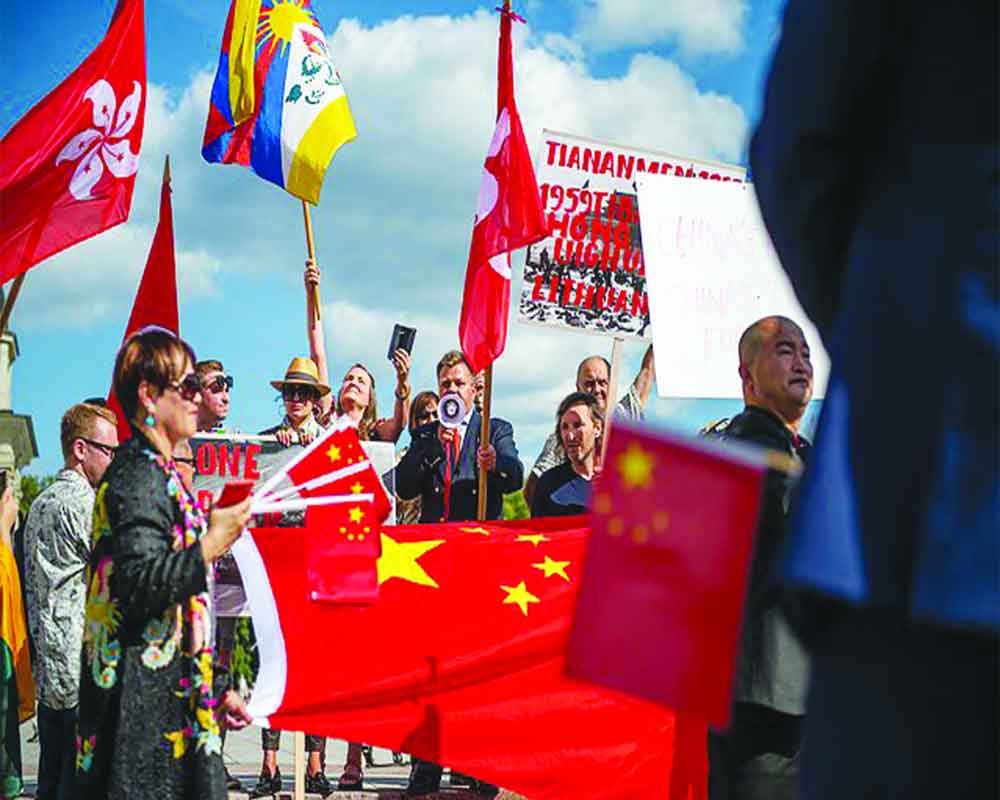When a democratic country takes a moral or sovereign stand against an authoritarian regime, very often its own trade engines apply the brakes
The overlapping realm of the European Union (EU) and military alliance of North Atlantic Treaty Organisation (21 of the 27 EU States are common) remains undecided on taking a firm stand on Ukraine, and the cause for disunity is essentially trade. Germany has been openly reluctant (and even dissuasive) to weigh in with the rest on taking on the Russian belligerence. At stake for the Germans is a multibillion-dollar gas pipeline (Nord Stream 2) and its existing ‘very reliable’ source of energy from Russia. Opinion polls on the German street also do not support taking a hard stance against Russia and, consequentially, the ability of NATO to stare back at Russia is compromised.
Basically, trade triumphs over taking a moral or sovereign stand. However, on another issue the EU has taken upon itself to defend a member State ie, Lithuania, over China’s alleged targeting of Lithuania on trade. At play is the coercive Chinese tact of weaponising all levers at its disposal, to attack the other, in this case, through the ‘weaponisation’ of trade. Chins has simply targeted and blocked Lithuanian imports, and the year-on-year comparison for December shows that imports have dropped by 91 per cent. Incredulously but expectedly, the Chinese deny any ‘discriminatory practices’ and attribute the same to ‘technical issues’ (reminiscent of ‘technical issues’ that the Chinese had infamously invoked at UNSC to veto declaring Pakistani terrorist Masood Azar a global terrorist). For once, the EU is furious at the Chinese brazenness and has decided to take the case to the WTO as it perhaps realises that unless it acts as ‘one’ to protect the integrity of Lithuania, it is only a matter of time before another member State faces Chinese retribution for taking moral stands.
What started as a David vs Goliath saga with Lithuania, having less than 3 million population (to China’s 1.4 billion), earning Beijing’s ire for allowing Republic of China (Taiwan) to open a representative office in its capital, Vilnius, escalated in a free-for-all as it tantamounts to deligitimising the ‘One China Principle’ that China guards zealously. Soon China recalled its ambassador and demanded that Lithuania do so too and symbolically downgraded the missions to charge d’affaires. The clash of a democratic Lithuania with an authoritarian China was brewing for some time with Lithuania having earlier opposed Hong Kong National Security Law at UNHCR, passing resolution against Uyghur genocide, calling out human rights in China and withdrawing from Winter Olympics. With over 6,000 km separating China from Lithuania, the attack came in the form of trade, and it hit hard with unacknowledged trade sanctions. Even here, the first other country to warn Lithuania to go slow on China was Germany as its Chambers of Commerce feared repercussions for German-owned factories to come under the Chinese scanner, next. Following the Chinese attack via trade, recent opinion polls showed that just a shockingly low figure (13%) of Lithuanians favoured showing any spine against China — an overwhelming majority opposed its Government! Yet again, trade considerations triumphed over national policies that had called out the Chinese amorality.
The classic weaknesses of democracy against authoritarian regimes like those in Moscow or Beijing are getting exposed in Ukraine and Lithuania, respectively. In democracies the ability of ‘industry’ to shape the popular narrative by itself is undeniable, whereas in statist regimes which are not answerable to individual opinions beyond a point, the inter-linkages between the ‘State’ and ‘industry’ are often invariable, though invisible. This enables statist regimes to attack using multi-pronged levers like trade or ‘industry’ in perfect unison and efficacy, like a sovereign weapon. But in democracies, the ‘industry’ and its imperatives can work overtly or covertly independent of the Government’s position.
The wounded Indo-Chinese situation is a glaring example of the same, with trade crossing $125 billion in 2021 (with a record $100 billion imports from China) — imports are higher by 30 per cent from 2019 and the trade deficit has mushroomed to a record high of nearly 70 billion, up 22 per cent from the pre-pandemic and pre-border clashes in 2019. Barring the much-touted and bandied bans on some Chinese apps like TikTok as ‘prejudicial to the sovereignty, integrity and security of India’, the insatiable hunger of Indian ‘industry’ has operated conversely to the political grandstanding. It can be logically argued that taking a hard stance against China on ‘industry’ may be detrimental to Indian interests (as exemplified by Germany or Lithuania), but it is the chasm between the political brave-talk against China versus the reality of ‘industry’ operating otherwise, that showcases the sad hypocrisy involved.
The rare oddity has been Australia, where the tough stand taken by its Government against China has been backed by its citizenry, ‘industry’ and even the Opposition (unlike in Lithuania, who have called for the Government to resign). Unless the ‘Free World’ countries walk the talk individually or multilaterally against threats from expansionist regimes like China, there will be no effective checkmating. Political posturing is easy, but demonstrating that same will is another matter, especially when ‘industry’ and its imperatives are driven by commercial interests solely that does not account for national pride at all.
(The writer, a military veteran, is a former Lt Governor of Andaman & Nicobar Islands and Puducherry. The views expressed are personal.)

























